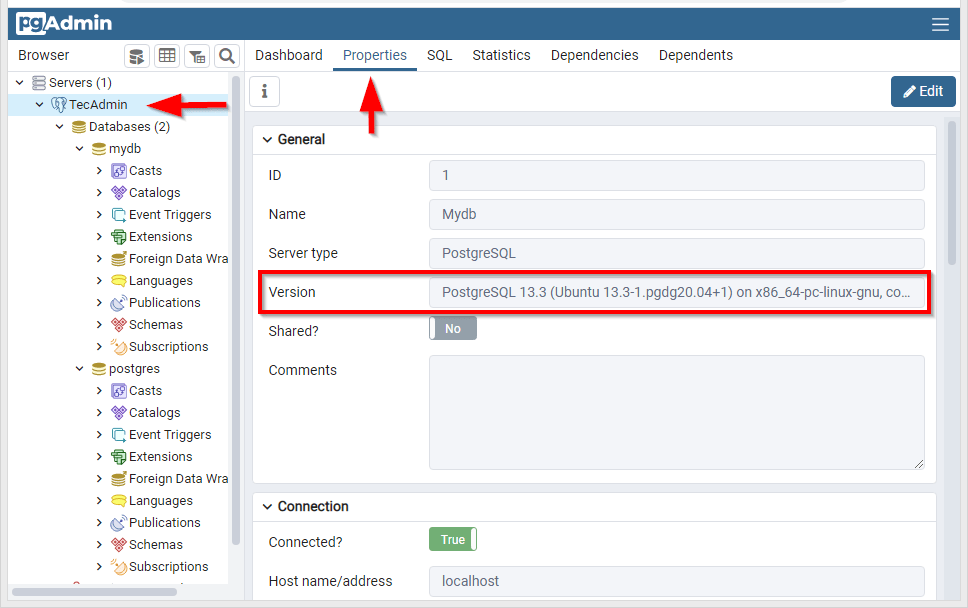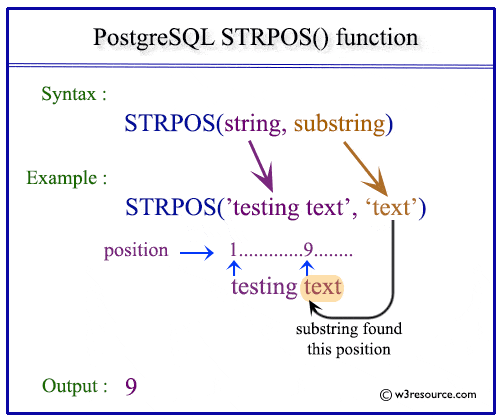

The jsonpath: $. SELECT magicword FROM gob WHERE 'shazam' LIKE (magicword '') ORDER BY magicword DESC LIMIT 1 This works because the longest match sorts last - so I sort DESC and pick the first match. Where jsonb_path_exists(params, '$.** ? = "string" & like_regex "authVar")') In Postgres 12+ the recursive searching in JSONB is pretty comfortable with the new feature of jsonpath.įind a string value containing authVar: select * The query is very fast but may return unexpected extra rows in cases when the searched string is a part of one of the keys. I would propose the brute force method which should work well: select * Additional string manipulation functions are available and are listed in Table 9-7. Can't promise this is the best way to do it, but it is a way to do it: with splits as ( select stringtoarray (bar, ',') as bararray from foo. Remove the longest string containing only the characters (a space by default) from the start/end/both ends of the string. More verbose but typically much faster than a (expensive) regular expression. For example, sentences that begin with "Cat" will be replaced with lower-case "dog" which break sentence capitalization.Ĭheck out the current PostgreSQL pattern matching docs for all the details.In Postgres 11 or earlier it is possible to recursively walk through an unknown json structure, but it would be rather complex and costly. the string before the last comma (',') that's delimited at the start either by a colon (':') or the start of the string. You can even use the regexpmatch (string, pattern, flags), which returns a null if no match is found. This will return the values carabc and abcd.
#Postgresql find substring code
The following illustrates the syntax of the substring function: SUBSTRING ( string ,startposition, length ) Code language: SQL (Structured Query Language) (sql) Let’s examine each parameter in detail: string is a string whose data type is char, varchar, text, etc. You can use the statement as follows to see if a string contains a sub-string or not: select from strings where str 'abc'.

SELECT regexp_replace('Cat bobcat cat cats catfish', '\mcat(s?)\M', 'dog\1', 'gi') Įven after all of that, there is at least one unresolved condition. The substring function returns a part of string. SELECT regexp_replace('Cat bobcat cat cats catfish', '\mcat\M', 'dog', 'gi')

SELECT regexp_replace('Cat bobcat cat cats catfish', 'cat\M', 'dog', 'gi') SELECT regexp_replace('Cat bobcat cat cats catfish', '\mcat', 'dog', 'gi') SELECT regexp_replace('Cat bobcat cat cats catfish', 'cat', 'dog', 'gi') The substring function returns a part of string. The POSITION() function returns an integer that represents the location of the substring within the string. The string argument is the string for which the substring is searched. SELECT regexp_replace('Cat bobcat cat cats catfish', 'cat', 'dog', 'g') The substring argument is the string that you want to locate.
#Postgresql find substring how to
SELECT regexp_replace('Cat bobcat cat cats catfish', 'cat', 'dog', 'i') Write the the generic query for the given problem in PostgreSQL format '901241,924685,924692,924670.' '901067,901069,901071,901071,901168,901168,901886,901891. This tutorial shows you how to use PostgreSQL substring function to extract substring based on start position and length, and based on a regular expression. SELECT regexp_replace('Cat bobcat cat cats catfish', 'cat', 'dog') Let's see how easy it is to replace a cat with a dog. There are usually quite a few gotchas when performing regex replacment. I will also use \m and \M to match the beginning and the end of a word, respectively. I will use flags i and g for case-insensitive and global matching, respectively. It returns the starting position of the substring within the string, or 0 if the substring is not found. Find a string value containing authVar : select from reports where jsonbpathexists(params, '. It has the syntax regexp_replace(source, pattern, replacement ). The PostgreSQL position function is used to find the location of a substring within a given string. In Postgres 12+ the recursive searching in JSONB is pretty comfortable with the new feature of jsonpath. If you need stricter replacement matching, PostgreSQL's regexp_replace function can match using POSIX regular expression patterns.


 0 kommentar(er)
0 kommentar(er)
